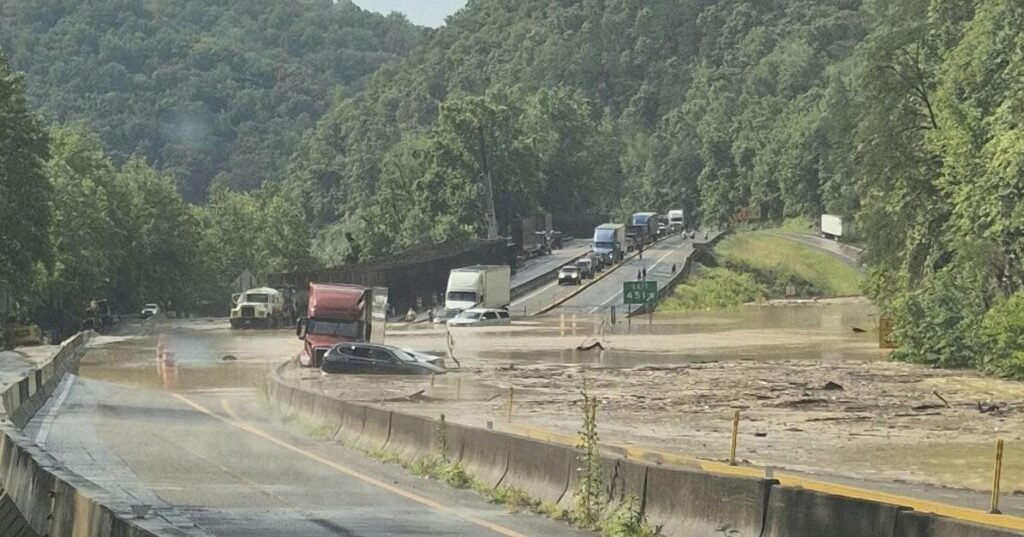Interstate 40 Closure: Heavy Rain and Rock Slide Impact Smoky Mountain Travel
The majestic Smoky Mountains region has once again been reminded of nature’s powerful force. A significant rock slide and flooding have shut down a crucial section of Interstate 40 – one of America’s most important cross-country highways. As someone who’s spent years exploring and writing about these ancient mountains, I know firsthand how dramatically weather events can transform this beautiful but sometimes temperamental landscape.
What Happened on Interstate 40?
On Wednesday afternoon, heavy rainfall triggered both flooding and a substantial rock slide near mile marker 450 in Hartford, Tennessee. This section runs through the narrow corridor that Interstate 40 carves through the Great Smoky Mountains – a passage I’ve traveled countless times in all seasons.
Engineers assessing the damage have estimated that this vital transportation artery will remain closed for at least two weeks. This timeline could potentially extend depending on weather conditions and the complexity of the removal and repair operations.

Impact on Travel Through the Smokies
This closure creates significant challenges for both locals and travelers. I-40 serves as a critical east-west connection, and its closure through the Smokies means travelers must now navigate alternative routes that can add considerable time to journeys.
For those unfamiliar with the area, this particular stretch of I-40 follows the Pigeon River Gorge – a breathtaking but geologically active area where the highway is essentially squeezed between steep mountain slopes and the river. It’s gorgeous country, but the same forces that created this stunning landscape also make it vulnerable to slides during heavy precipitation events.
Recommended Detour Routes
If you’re planning travel through this region in the coming weeks, consider these alternatives:
- I-81 to I-26 through Johnson City and Asheville
- US-25/US-70 through Hot Springs (though this route has limited capacity)
- For longer-distance travelers, consider routes well north or south of the Smokies entirely
Not the First Time: History of I-40 Closures in the Smokies
As someone who’s written about the Smokies for years, I’ve documented several major closures of this same stretch of interstate. The geography that makes the Smoky Mountains so spectacular – steep slopes, abundant rainfall, and fractured rock formations – also creates perfect conditions for slides.
In 2009, a massive rock slide closed this same corridor for several months. Similar events have occurred in 1997, 2012, and 2019. Each time, engineers face the challenge of not just clearing debris but ensuring the mountainside is stabilized to prevent immediate recurrence.
Why This Area Is Prone to Slides
Having hiked countless trails throughout these mountains, I’ve witnessed firsthand the geological factors at play:
- Steep mountain slopes immediately adjacent to roadways
- High annual rainfall (some parts of the Smokies receive over 85 inches annually)
- Fractured bedrock from millions of years of geological activity
- Freeze-thaw cycles that gradually loosen rock formations
Economic Impact on Local Communities
Beyond the inconvenience to travelers, these closures significantly impact local economies that depend on tourism and transportation. Communities like Hartford, Newport, and others along this corridor rely heavily on the steady flow of visitors and commerce that I-40 brings.
Local businesses from gas stations to restaurants will feel the effects of reduced traffic, particularly if the closure extends beyond the initial two-week estimate – something I’ve unfortunately seen happen with previous slides in the area.
What Travelers Should Know
If you’re planning a trip to the Smoky Mountains in the coming weeks, here are my recommendations:
- Allow extra travel time if your route would normally include this section of I-40
- Check the Tennessee Department of Transportation website for the latest updates
- Consider adjusting your itinerary to approach the Smokies from a different direction
- Remember that while one road is closed, the majority of the region remains accessible
Despite this temporary setback, the Smoky Mountains remain as magnificent as ever. Having spent countless days exploring their misty ridges, I can assure you that a detour is a small price to pay for experiencing one of America’s most beloved natural treasures.
The Silver Lining
While road closures are never convenient, they do provide an important reminder of the raw power of the natural world. These mountains have stood for millions of years, shaped by the very same forces we’re witnessing today. Each rock slide is, in a sense, just another chapter in the ongoing geological story of the Smokies.
As repairs progress, I’ll continue to provide updates on this situation. The resilience of both the landscape and the communities that call it home never fails to inspire me, even in challenging circumstances like these.
Source: Associated Press

